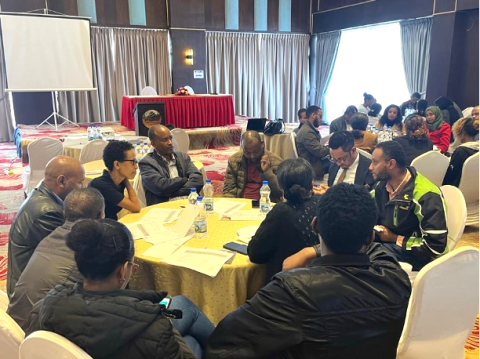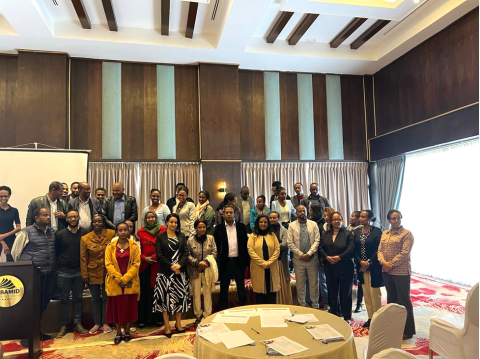Ethiopia's community of practice for gender equity and social inclusion in climate change actions
Ethiopia's community of practice for gender equity and social inclusion in climate change actions
Arsema Andargatchew and Robi Redda from CDKN reflect on the second meeting of Ethiopia's national community of practice for Gender Equity and Social Inclusion in Climate Change actions. The community’s ambitious yet realistic plans include gender-responsive policy analysis and fund mobilisation strategies, all guided by five key pillars of action.
The Government of Ethiopia has shown a strong commitment to mainstreaming both gender and climate change in its development agenda. However, institutional and practical gaps have been identified in integrating gender into climate policy and practice. It was with this in mind that the national community of practice for Gender Equity and Social Inclusion (GESI) in Climate Change actions was established in December 2020. The community of practice convened for the first time in April 2021 and subsequently organised its second gathering in Ethiopia in August 2023.
At the time of the community of practice establishment, the Climate Resilient Green Economy (CRGE) facility, which is housed in the Ministry of Finance was leading the ministries that are significantly involved in climate change actions. The CRGE received financial and technical support from the Climate and Development Knowledge Network (CDKN) and the Global Green Growth Institute (GGGI).
In 2023, during the scoping of the new five-year phase of CDKN, discussions among CDKN, GGGI and the Ministry of Planning and Development (MoPD) led to the recognition of the importance of the community of practice and the need to support it. MoPD assigned their involvement in the community of practice to its Chief of Staff, demonstrating a strong commitment to support the initiative. Based on this, the three institutions called the second meeting of the community of practice with the aim of revising its terms of reference and annual work plan and initiating discussions on member commitment and sustainability.
Delivered by the State Minister of MoPD, the meeting was opened with a strong government commitment. The minister stated, ‘our ministry is ready to support and facilitate the smooth operation of this community of practice. I call upon everyone who is here today to use your capacity to serve this group, share about it in your organisations and use opportunities that will ensure its sustainability’.
Pillars of the community of practice
The following five pillars will guide the actions of the community of practice:
- Engaging strategic decision-makers
- Planning a harmonised and aligned investment programme, capacity development and implementation
- Advocacy and lobbying
- Resource mobilisation
- Monitoring, evaluation, learning and reporting

Key outcomes for the community of practice
Structure and composition
The Ministry of Women and Social Affairs (MoWSA) and MoPD will co-chair the community of practice while the climate unit in MoPD will serve as a secretariat. Members will include sector ministries, Civil Society Organisations (CSOs), development partners, academia and the private sectors.
Portfolio of members
To widen the members of the community of practice, invitations were extended to various institutions including CSOs, UN agencies and private actors. However, the turnout of these institutions was quite limited. It was evident that personal communications are vital to share deeper intentions of the initiative and inspire collaboration. Therefore, prior to the following meeting, additional effort will be put into contacting different actors.
Ambitious but realistic plan
Until the community of practice mobilises funds to implement targeted activities, it is essential to have a realistic plan of action that can be carried out with the resources available. This includes identifying and prioritising policies that require gender responsive analysis, key climate change stakeholders and programmes and ways to participate in and share about the initiative in national, regional and international meetings. The plan's development of a fund mobilisation strategy will also be crucial.
Capacity strengthening initiatives
From the establishment of the group the need for capacity strengthening among the members was identified. To initiate this process, it was agreed that CDKN and GGGI will deliver capacity strengthening training using the CDKN’s GESI and climate change training modules.
As the community of practice members continue to gather and communicate with one another, they envisage discovering better ways to implement their planned actions. According to Etienne Wenger, one of the individuals who coined the term: ‘communities of practice are groups of people who share a concern or a passion for something they do and learn how to do it better as they interact regularly’. In the feedback given at the end of the meeting, MoPD’s chief of staff, Shalom Gebredingle said ‘[the meeting] helped me to network with stakeholders and learn best practices’.
The full workshop report is available here.

